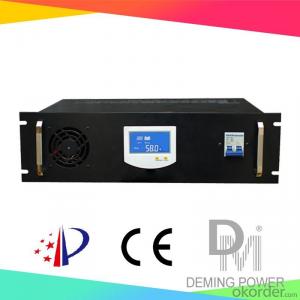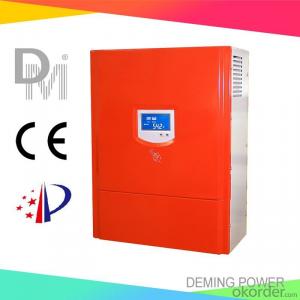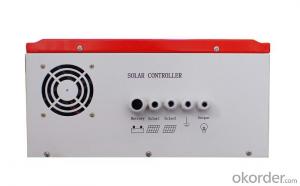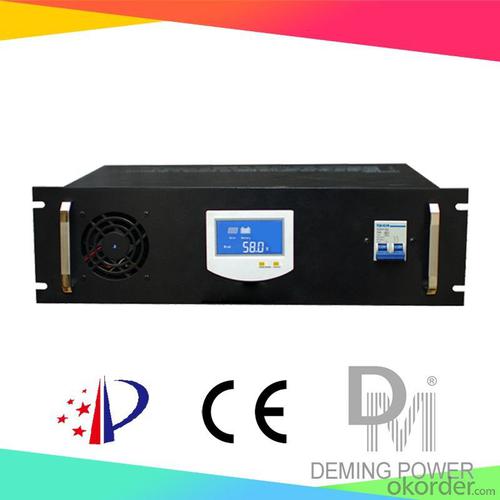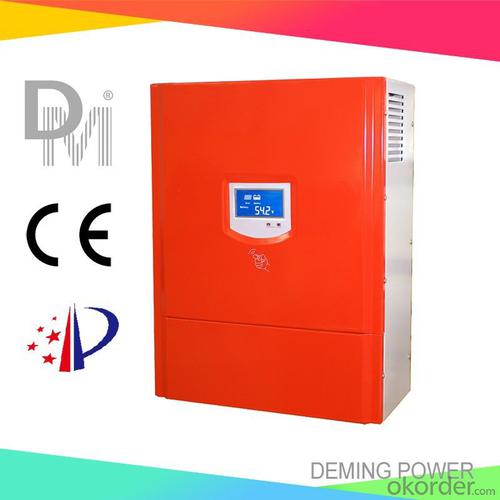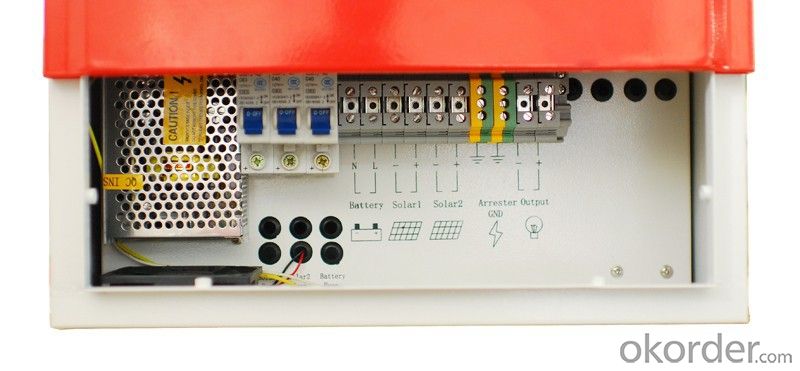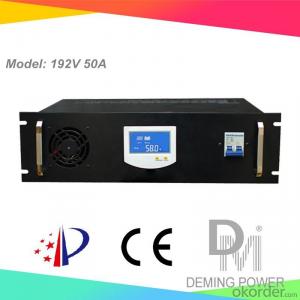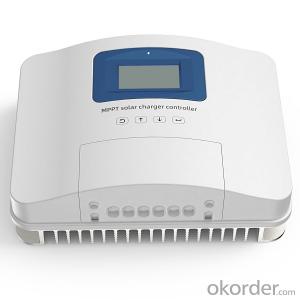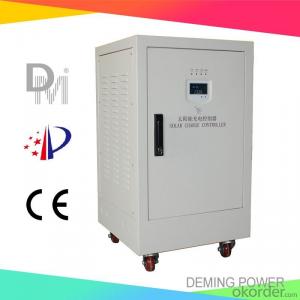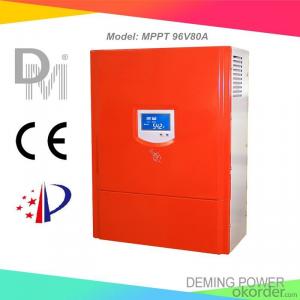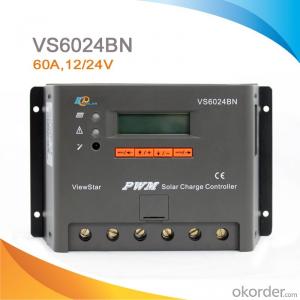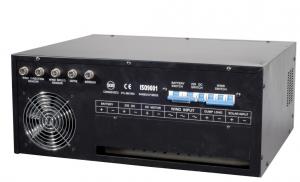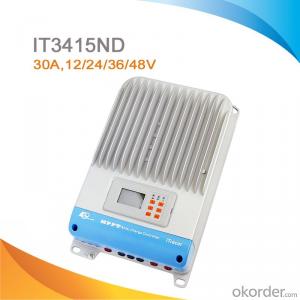High Voltage Solar Controllers - MPPT Solar Charge Controller 96V 60A for Off Grid Solar Power System and RS485 Available
- Loading Port:
- Qingdao
- Payment Terms:
- TT OR LC
- Min Order Qty:
- 1 PCS
- Supply Capability:
- 1000 PCS/month
OKorder Service Pledge
OKorder Financial Service
You Might Also Like
Properties of the solar charge controller
1. Design for off-grid solar power system.
2. Applicable to different kinds of batteries.
3. Adopts MPPT technology (Maximum Power Point Tracking). The advanced tracking algorithm make the solar module operate at ideal voltage which the solar modules can produce the maximum available power.
4. Modular design with simple structure and easy maintenance.
5. Automatic power control function.
6. LCD display: Solar panel current, solar panel voltage, solar panel power, battery group voltage, charge current.
7. Perfect protection function: Solar reverse charge protection, Solar reverse connection protection, Battery reverse connection protection, Battery overcharge protection, Battery over current protection etc ,thus the system has higher reliability.
Technical parameters of the solar charge controller
Model | 96V60A | ||
Battery group rated voltage | 96Vdc | ||
PV Rated current | 60A | ||
PV open circuit voltage | 400V | ||
PV Max. power | 5760Wp | ||
MPPT input DC voltage rang | 80-116Vdc | ||
Input PV module road number | 1 | ||
Function | MPPT charge mode, auto stop charge, auto recharge voltage; Protection: connecting contrary, over current, short circuit, over heat etc. | ||
Display mode | LCD | ||
Display content | solar panel voltage, solar panel current, solar panel power, battery voltage, charge current | ||
Floating Charge Voltage (adjustable) | 110Vdc | ||
Stop charge voltage | 116Vdc±2% | ||
Recharge voltage | 108V±2% | ||
Voltage drop between PV and battery | 1.5V | ||
Max itself power consumption | 100mA-150mA | ||
Work environment temperature | -30-60°C | ||
Relative humidity | 90% No condensation | ||
Applicable altitude | 3000m The rated power should be reduced when it is higher than 2000m | ||
Noise (1m) | 40dB | ||
Degree of protection | IP20(Indoor) | ||
Cooling method | Forced air cooling | ||
*Communication interface (optional) | RS485/USB | ||
*Temperature compensation(optional) | -4mv/°C/2V,-35°C~+80°C,Accuracy:±1°C | ||
Product size (mm) | 520*430*200mm, 480*360*150mm | ||
Weight(kg) | 13Kg, 18kg | ||
*Above parameter only for reference. Could be custom made to user specifications.
- Q: How do I determine the maximum solar panel input current for a solar controller?
- In order to determine the maximum solar panel input current for a solar controller, several factors must be considered and calculations need to be performed. The following steps outline the process: 1. Begin by checking the specifications of your solar controller. The manufacturer typically provides product specifications that include the maximum solar panel input current. Look for the "Max Input Current" or "Max PV Current" rating. This value represents the highest current that the solar controller can handle. 2. Next, determine the maximum current rating of your solar panels. This information is usually available in the specifications or datasheet of the panels. Look for the "Imp" (maximum power current) or "Isc" (short-circuit current) rating. This value represents the maximum current that the solar panels can generate under optimal conditions. 3. Take into account the total number of solar panels in your system. If you have multiple panels connected in series or parallel, you must consider the combined current they generate. In series connections, the current remains the same, while in parallel connections, the currents add up. 4. Check the voltage compatibility. Make sure that the voltage output of your solar panels aligns with the voltage input range of your solar controller. If the voltages do not match, you may need to use a voltage converter or select a different solar controller. 5. Perform the necessary calculations. Multiply the maximum current rating of a single solar panel (Imp or Isc) by the number of panels in the system. If you have parallel connections, add up the currents. For series connections, the current remains the same. 6. Compare the calculated current with the maximum input current rating of the solar controller. If the calculated current is lower than or equal to the maximum input current rating of the solar controller, it is compatible. However, if the calculated current exceeds the maximum input current rating, you will need to either reduce the number of panels or choose a different solar controller with a higher input current rating. Always refer to the product manuals, datasheets, or contact the manufacturer for accurate and specific information regarding your solar panels and solar controller.
- Q: Can a solar controller be used with different types of batteries (e.g., lead-acid, lithium-ion)?
- Yes, a solar controller can be used with different types of batteries including lead-acid and lithium-ion. However, it is important to ensure that the solar controller is compatible with the specific type of battery being used in order to optimize charging and prevent damage to the battery.
- Q: How do solar controllers help in maximizing energy harvest?
- Solar controllers play a crucial role in maximizing energy harvest from solar panels by efficiently managing and regulating the flow of electrical energy. These devices are designed to monitor and control the charging process of batteries connected to solar panels. One key function of solar controllers is to prevent overcharging of batteries, which can lead to reduced battery capacity and lifespan. By constantly monitoring the battery voltage and current, solar controllers ensure that the batteries are charged optimally, preventing any damage due to overcharging. This feature is particularly beneficial in areas with high solar radiation, where the risk of overcharging is higher. Solar controllers also help in maximizing energy harvest by implementing a technique called maximum power point tracking (MPPT). MPPT technology allows the solar controller to continuously adjust the voltage and current from the solar panels to the optimal levels that produce the maximum power output. By dynamically tracking the maximum power point, solar controllers ensure that the solar panels operate at their most efficient state, even under varying weather conditions or changes in solar intensity. Furthermore, solar controllers often have additional features such as load control and time-based control. Load control allows the solar controller to regulate the power supplied to loads connected to the system, preventing overconsumption or overdischarge of the batteries. Time-based control enables users to program specific time intervals for the solar panels to charge the batteries, ensuring that energy harvest is maximized during periods of peak sunlight. In summary, solar controllers maximize energy harvest by preventing overcharging of batteries, implementing MPPT technology to optimize the power output of solar panels, and providing additional features for load and time-based control. These devices play a crucial role in ensuring the efficient and effective utilization of solar energy, ultimately leading to increased energy harvest and improved system performance.
- Q: Can a solar controller be used with a solar-powered refrigerator?
- Yes, a solar controller can be used with a solar-powered refrigerator. A solar controller is responsible for regulating the amount of electricity flowing from the solar panels to the batteries. Since a solar-powered refrigerator requires electricity to operate, a solar controller helps ensure that the refrigerator receives the appropriate amount of power from the solar panels, thus making it compatible with a solar controller.
- Q: Are there any safety features in solar controllers?
- Yes, there are several safety features in solar controllers. One of the main safety features is overcharge protection. Solar controllers are designed to prevent the batteries from overcharging by regulating the amount of current flowing into the batteries. Once the batteries are fully charged, the solar controller will automatically reduce or stop the charging process to prevent damage to the batteries. Another safety feature is over-discharge protection. Solar controllers monitor the voltage of the batteries and prevent them from discharging below a certain threshold. This helps to prolong the lifespan of the batteries and prevents damage that can occur from over-discharging. Short circuit protection is also an important safety feature in solar controllers. In the event of a short circuit, the solar controller will detect the abnormal current flow and automatically shut off the circuit to prevent any damage to the solar panels, batteries, or other connected devices. Additionally, some solar controllers have temperature compensation features. These controllers can adjust the charging voltage and current based on the temperature of the batteries, ensuring optimal charging performance and preventing overheating or damage due to extreme temperature conditions. Overall, solar controllers are equipped with various safety features to protect the batteries, solar panels, and other connected devices from potential hazards and ensure efficient and safe operation of the solar power system.
- Q: Can a solar controller handle power surges from the inverter?
- No, a solar controller is not designed to handle power surges from the inverter. Its main function is to regulate the charging and discharging of the battery bank in a solar power system. Power surge protection is typically handled by surge protectors or surge suppressors installed in the electrical system.
- Q: How does a solar controller handle variations in load power requirements?
- A solar controller handles variations in load power requirements by continuously monitoring the amount of power needed by the load and adjusting the flow of energy from the solar panels accordingly. When the load power requirement increases, the solar controller increases the flow of energy from the solar panels to meet the demand. This is usually achieved by increasing the duty cycle of the controller, allowing more energy to be transferred from the panels to the load. Conversely, when the load power requirement decreases, the solar controller reduces the flow of energy from the solar panels to avoid overcharging the batteries or wasting excess energy. It achieves this by decreasing the duty cycle, limiting the amount of energy transferred from the panels to the load. Solar controllers also employ various algorithms and control mechanisms to optimize the balance between energy generation and load consumption. These algorithms may include maximum power point tracking (MPPT) to ensure that the solar panels operate at their most efficient point, as well as voltage and current regulation to protect the batteries and load from potential damage. Overall, a solar controller plays a crucial role in managing the power flow between solar panels and the load, ensuring that variations in load power requirements are handled efficiently and effectively.
- Q: Can a solar controller be used with a solar-powered office building?
- Yes, a solar controller can be used with a solar-powered office building. A solar controller is a device that regulates the charging and discharging of batteries in a solar power system. It helps manage the flow of electricity from the solar panels to the batteries and the building's electrical system. Therefore, it is an essential component in ensuring the efficient and effective utilization of solar energy in a solar-powered office building.
- Q: What is the maximum load current of a solar controller?
- The maximum load current of a solar controller is determined by its specifications and capabilities. Solar controllers are specifically designed to regulate and control the electricity flow from solar panels to the load, which can be batteries or appliances. The maximum load current refers to the highest current amount that the solar controller can handle without becoming overloaded. Typically, the product specifications of a solar controller will mention its maximum load current. It is crucial to select a solar controller with a maximum load current that is appropriate for the intended load. Going beyond the maximum load current can result in overheating and potential harm to the controller. To ascertain the suitable maximum load current for your specific requirements, consider the power needs of the load you are connecting to the solar controller. Make sure that the solar controller's maximum load current is equal to or greater than the load's maximum current draw. This will guarantee the safe and efficient functioning of both the solar controller and the connected load. Additionally, it is worth mentioning that certain solar controllers offer protective features like overload protection and short circuit protection. These features can help safeguard the controller from excessive current flow and prevent any potential damage.
- Q: Can a solar controller handle multiple solar panels?
- Yes, a solar controller can handle multiple solar panels. Solar controllers are designed to regulate the charging process of solar panels and manage the power output. They can be connected to multiple solar panels, allowing for efficient and effective utilization of solar energy.
Send your message to us
High Voltage Solar Controllers - MPPT Solar Charge Controller 96V 60A for Off Grid Solar Power System and RS485 Available
- Loading Port:
- Qingdao
- Payment Terms:
- TT OR LC
- Min Order Qty:
- 1 PCS
- Supply Capability:
- 1000 PCS/month
OKorder Service Pledge
OKorder Financial Service
Similar products
Hot products
Hot Searches
Related keywords
